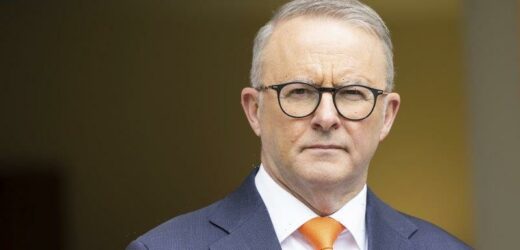The devastating line that worked so well for Labor only months ago is now rebounding on Jim Chalmers in a budget that cannot guarantee the most important election promise of all.
“Everything is going up except your wages,” voters were told in a relentless Labor message before the election. “Only Labor has a plan to get wages moving.”
Prime Minister Anthony Albanese.Credit:Alex Ellinghausen
That plan is now hostage to a global economy on the slide, energy prices on the rise and inflation out of control.
Another election pitch was to cut household power bills by $275 a year by 2025 thanks to a mammoth investment in the electricity grid to shift to renewables, but the budget has an utterly different message about the pressure on households from higher prices.
Electricity prices will rise 20 per cent this year and 30 per cent next year, while gas prices will rise 20 per cent in both years.
So, this is not a typical first budget after a party is swept into power. This budget delivers on election promises but only up to a point. Some promises have fallen by the wayside.
The treasurer hopes to have inflation falling next year and real wages rising in 2024 – just before the next election. In political terms, the most important metric is no longer the deficit. It is the wage price index of 3.75 per cent in that year, just ahead of inflation of 3.5 per cent.
If that changes, Labor goes to the next election with a cut in real wages. Opposition Leader Peter Dutton would have the same line of attack that Labor used so well this year.
The most challenging feature of this budget is that it cannot be a full blueprint for the True Believers. There is no cash for households because that would only fuel inflation. There is no major new social program to help the disadvantaged. No tax overhaul to help the battlers.
The essential political calculation is to hasten slowly with the first Labor budget in nine years. The stage three tax cuts stay in place, at a cost of $254 billion over a decade, because of the danger of breaking an election pledge.
Chalmers used his budget speech on Tuesday night to set the benchmarks for tax and other policies – that the test was all about “what’s affordable and what’s fair” in economic and fiscal policy. This was a hint, perhaps, of future changes to the tax plan.
With inflation eating into wages, the Labor pitch on earnings has to move to a different arena: the industrial relations bill that goes to parliament on Thursday. The promise in this bill is to “get wages moving” by helping unions reach pay deals across industries with multiple employers.
Prime Minister Anthony Albanese appears set on giving the ACTU what it wants with multi-employer bargaining despite concerns among employers about a regime that increases union power and compels companies to join deals that push up their costs.
“The cost of everything is going up – but your pay isn’t,” Albanese said in his budget reply speech only seven months ago. He set the expectations that will shape the way Australians respond to this budget.
Will this new workplace regime lift wages? Or will it drive up costs and, in turn, start a blame game about higher prices? Labor is yet to prove that its law can boost productivity – yet this must be the essential outcome when the outlook is for slower economic growth and mounting debt.
The workplace law curls around the budget so tightly that the two agendas are completely intertwined.
The force shaping this budget is inflation. Chalmers has said so at every opportunity, and he hammered the message in his press conference in the budget lock-up.
The consumer price index will be 5.75 this year, when the March budget told voters it would be 4.25 per cent.
Chalmers, to his credit, identified this threat as shadow treasurer. “What’s missing in the budget is a longer-term plan to take some of the sting out of inflation,” he said in March.
Has he come up with that longer-term plan? This budget is a start. It is careful with taxpayer funds without embarking on major changes that put Labor’s political capital at risk.
The tough decisions are being put off until the next budget, in May, or a longer debate over this term of parliament.
That is why Chalmers calls this budget the start of a “conversation” about hard decisions. Labor is waiting to hear community feedback on that conversation before it makes big calls about unpopular policies that might cut spending and increase tax revenue.
Cut through the noise of federal politics with news, views and expert analysis from Jacqueline Maley. Subscribers can sign up to our weekly Inside Politics newsletter here.
Most Viewed in Politics
From our partners
Source: Read Full Article



